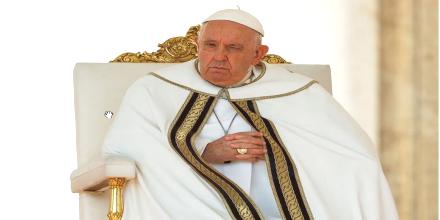Pope Francis shapes future. Appoints 21 cardinals for progressive, diverse church
30.09.2023 posted by Admin

Pope Francis solidified his legacy by appointing 21 new cardinals during a ceremony in St. Peter's Square. These cardinals are his closest advisors, known as the "princes of the Church," and they now form a significant portion of the cardinal electors who may choose his successor.
This move increases the likelihood, though not guaranteeing it, that the next pope will share Francis' vision of a more progressive and inclusive Catholic Church. Eighteen of the 21 newly appointed cardinals are under the age of 80, making them eligible to participate in the secret conclave to elect the next pope. The remaining three were honored for their long service to the Church.
These new cardinals hail from various countries, including the United States, France, Italy, Argentina, Switzerland, South Africa, Spain, Colombia, South Sudan, Hong Kong, Poland, Malaysia, Tanzania, Venezuela, and Portugal. Notably, South Sudan received its first cardinal, and Malaysia received its second, aligning with Francis' commitment to recognizing regions he considers "peripheries" of the world.
One significant appointment is Bishop Stephen Chow Sau-Yan of Hong Kong, who plays a vital role in Catholic-Chinese relations. Another is Italian Bishop Pierbattista Pizzaballa, overseeing the Holy Land, where the Vatican is concerned about the historical Christian presence.
During the ceremony, Pope Francis emphasized the importance of diversity, calling it indispensable. He delivered this message while each new cardinal received a ring of office and the iconic red "biretta" hat.
This consistory marks the pope's ninth since his election in 2013, reflecting the changing demographics of cardinal electors over the past decade, with more representation from Asia and Africa and less from Europe.
Pope Francis, who will turn 87 in December, continues to maintain a busy schedule despite some health challenges. He is set to open a month-long Vatican synod on October 4, which could shape the Church's future. In his homily, he emphasized the need for a harmonious and synodal Church, using an orchestra metaphor to convey the importance of unity among different sections of the Church.
The synod, prepared over two years with input from Catholics worldwide, aims to reshape the Church's power dynamics, giving a greater voice to lay Catholics, including women, and marginalized individuals. While proponents see this as a positive step, conservatives fear it may undermine the Church's hierarchical structure and dilute traditional doctrine. The process will continue with a second final session in 2024.
This move increases the likelihood, though not guaranteeing it, that the next pope will share Francis' vision of a more progressive and inclusive Catholic Church. Eighteen of the 21 newly appointed cardinals are under the age of 80, making them eligible to participate in the secret conclave to elect the next pope. The remaining three were honored for their long service to the Church.
These new cardinals hail from various countries, including the United States, France, Italy, Argentina, Switzerland, South Africa, Spain, Colombia, South Sudan, Hong Kong, Poland, Malaysia, Tanzania, Venezuela, and Portugal. Notably, South Sudan received its first cardinal, and Malaysia received its second, aligning with Francis' commitment to recognizing regions he considers "peripheries" of the world.
One significant appointment is Bishop Stephen Chow Sau-Yan of Hong Kong, who plays a vital role in Catholic-Chinese relations. Another is Italian Bishop Pierbattista Pizzaballa, overseeing the Holy Land, where the Vatican is concerned about the historical Christian presence.
During the ceremony, Pope Francis emphasized the importance of diversity, calling it indispensable. He delivered this message while each new cardinal received a ring of office and the iconic red "biretta" hat.
This consistory marks the pope's ninth since his election in 2013, reflecting the changing demographics of cardinal electors over the past decade, with more representation from Asia and Africa and less from Europe.
Pope Francis, who will turn 87 in December, continues to maintain a busy schedule despite some health challenges. He is set to open a month-long Vatican synod on October 4, which could shape the Church's future. In his homily, he emphasized the need for a harmonious and synodal Church, using an orchestra metaphor to convey the importance of unity among different sections of the Church.
The synod, prepared over two years with input from Catholics worldwide, aims to reshape the Church's power dynamics, giving a greater voice to lay Catholics, including women, and marginalized individuals. While proponents see this as a positive step, conservatives fear it may undermine the Church's hierarchical structure and dilute traditional doctrine. The process will continue with a second final session in 2024.